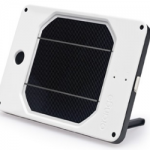 A USB solar charger is relatively new in the consumer market. A large percentage of people are still completely unaware of its availability as an efficient power backup device. There are, however, a growing number of outdoorsmen that are finding out the benefits of utilizing USB solar chargers during long-distance trips.
A USB solar charger is relatively new in the consumer market. A large percentage of people are still completely unaware of its availability as an efficient power backup device. There are, however, a growing number of outdoorsmen that are finding out the benefits of utilizing USB solar chargers during long-distance trips.
An increasing number of Green urban dwellers are also becoming familiar of the benefits that they can derive from utilizing USB solar chargers as well. This article will discuss everything and anything that you need to know about USB solar chargers. Shopping tips are also provided so you can make an informed purchase when buying a solar charger for personal use.
A USB solar charger is a backup device that primarily generates energy from direct sunlight. Harnessing energy is made possible by solar panels that trap the light that is emitted by the sun. Solar energy is then used to charge electronic devices and gadgets. A battery pack included in a USB solar panel automatically charges as well when no device is attached to the solar charger. This feature makes it possible for users to charge devices by tapping juice from the on-board battery of a USB solar panel.
USB solar panels come in various shapes and sizes. Small, pocket-size USB solar panels are compact, lightweight, and highly-mobile making them the perfect backup device to carry with you during long backpacking trips. USB solar chargers that feature small size and dimensions can fit perfectly inside a user’s pocket. A pocket-size USB solar charger with efficient charging capacity is more expensive than solar chargers on backpacks and foldable solar panels.
Solar backpacks on the other hand are great for individuals who want a portable charging device. Unlike solar panels that need to be carried by hand, solar backpacks are usually carried on the back of a user. Solar cells that are used in backpacks boast features that enable them to function optimally amidst heavy rains, winds, and extreme heat. Since solar panels are placed in a carry-on bag, users can charge devices while on the go. Extra pockets enable users to fill in the spaces with essential items like food and extra clothes.
Solar panels are ideal power backup solutions for campers. Since campers stay in a single outdoor location for a longer period of time, they can readily use solar panels by simply placing them flat on a surface that receives ample sunlight. A full seven hours under the sun completely charges the on-board batteries. Solar panels can also be used in the urban setting as a sensible power source alternative. Instead of plugging your phone or mp3 into an electronic outlet, you can simply use solar panels in charging laptops and other low-energy draw devices. This is definitely true when you are outside the home or the office, and there are no available power outlets around. Not only are you saving on energy bills, you are reducing your carbon footprint as well.
Majority of solar panels that are sold in the market features USB connectivity. This means that a user can connect the solar charger into a USB-enabled device such as those that are found in desktops and laptops. The USB power outlet facilitates charging through a device with USB connectivity. Charging using USB connectivity is obviously faster and more efficient. You do not need the sunlight for the charger to store and supply energy to other devices. USB solar panels are also called hybrids. USB solar panels, due to its dual function, are relatively more expensive than those models that do not have USB capabilities.
A USB solar charger is a highly versatile power backup device as you can use them in both outdoor and indoor settings. You can save on energy bill if you are going to utilize them when you are on-the-go. Solar panels eliminate the need for campers and hikers to purchase additional batteries as well. Given that a USB solar charger features the right power capacity and voltage to match those of electronic devices, you are guaranteed that your electronic gear is charged to their fullest.
USB Solar Charger Shopping Tips
- Purchase a USB solar panel that includes various connecting tips for your devices. Solar chargers that display 2 USB ports will enable you to charge two devices at a time. Make sure that all connecting tips exactly match those of your devices.
- If you are unsure of which solar charger is great for your gadgets, purchase a universal USB solar panel instead. However, if you want to optimize the use of your solar charger, calculate the wattage of your gadgets and compare the values to that of your solar panels. By rule, it is generally fine to plug in your devices to a solar charger that features higher wattage and power. Plugging your phone or mp3 into a solar panel that feature more than 2 volts of excess wattage may cause your gadgets to blow up or stop working. Utilizing a USB solar panel that is below the actual wattage of your devices will not supply or charge electricity.
- Purchase a solar charger that is compact and durable. Once you have experienced the efficiency of solar panels in storing and supplying energy, you will be eager to use them daily. A reliable and durable USB solar charger can lasts for a long time, that is, if proper care is followed and practiced by its users.
[signoff1]

